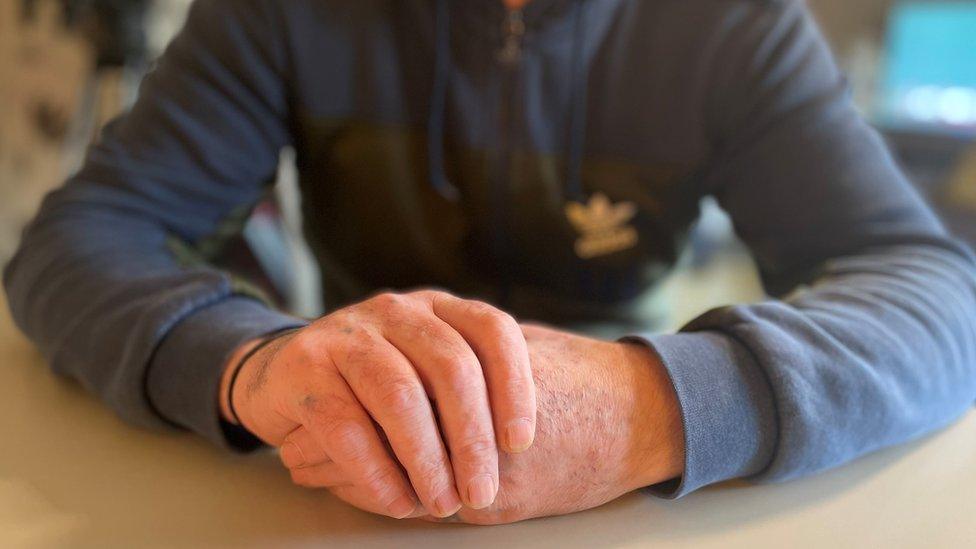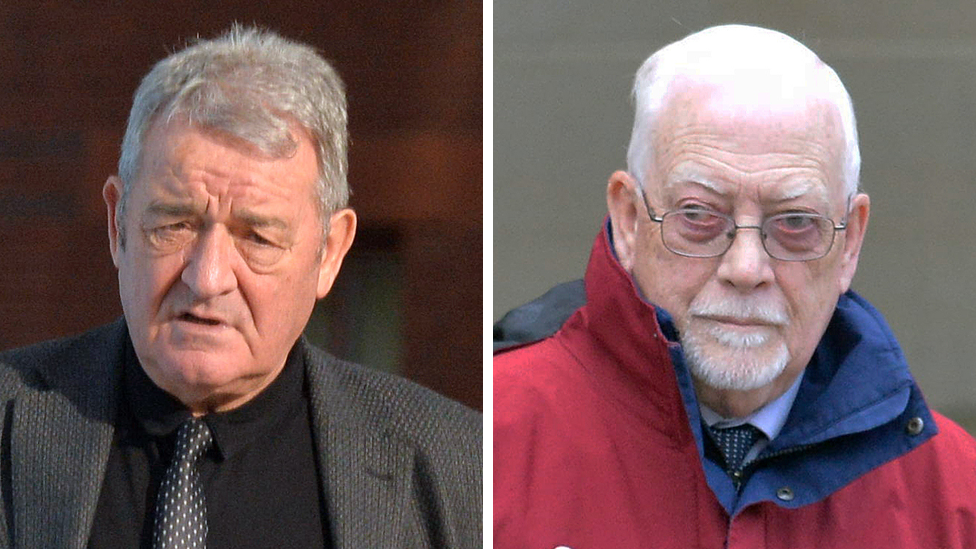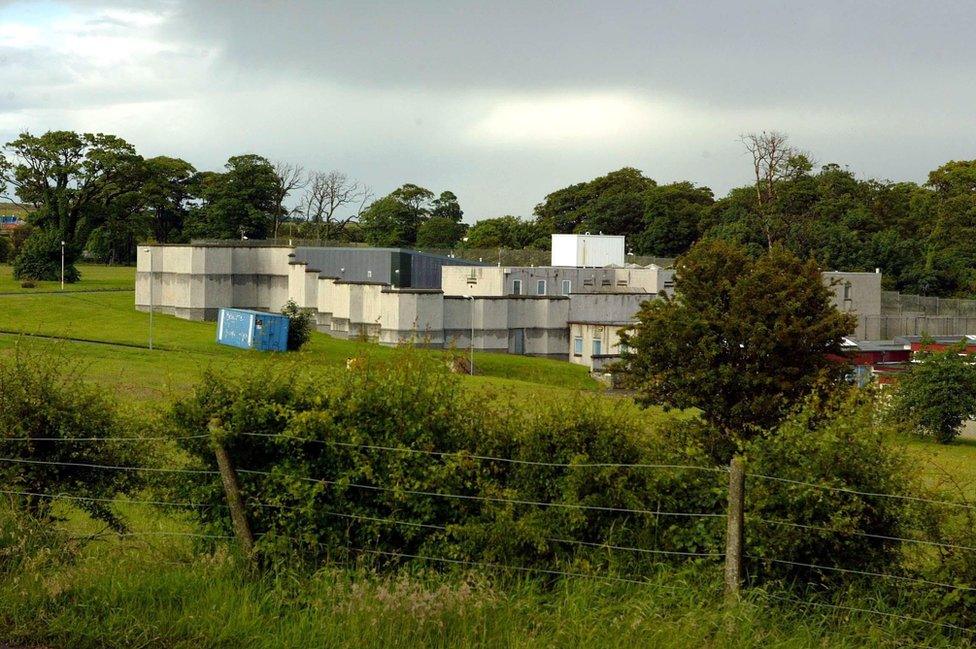Kerelaw school abuse victim: 'I was always scared'
- Published

A victim of abuse at Kerelaw school has told how his ordeal left him "always scared".
Thomas was 12 when he arrived at the council-run residential school in Stevenston, North Ayrshire, in June 1982.
On Friday two men were found guilty of a catalogue of physical and sexual abuse against 28 vulnerable children at the school over three decades.
It is the second time Matthew George and John Muldoon have been convicted of offences against young people at Kerelaw.
Thomas told BBC Scotland how he became a pupil after he began sniffing glue and engaging in minor criminality, such as shoplifting.
His family life had been blighted by alcoholism and, as he was small for his age, he became an immediate target for bullies.
Thomas' first interaction with Matt George came during a staff vs pupils football match.
Now 53, he recalled how he put the ball through the teacher's legs, leading to George being mocked by other teachers and pupils.
Thomas said: "He took it as a sign of disrespect and from then on, he launched a campaign of violence and hatred towards me."

Matthew George (left) and John Muldoon (right) were convicted after a trial at the High Court in Glasgow
Over the course of two years at the school, George - who was described by the ex-pupil as a "martial arts man" - subjected Thomas to physical and indecent assaults.
Thomas said: "He would use pressure points holds, strangle holds. Play mind games anytime he was around about me. I didn't know if he was going to hit me.
"It was always scary to be in his presence. He was like a Dr Jekyll and Mr Hyde.
"He was just very unpredictable. Days would go by and he wouldn't touch me at all and I would feel maybe whatever he had against me was finished.
"And soon as I thought that the hitting would start again. I was only 4ft tall at the time he was beating me up."
'Challenging and vulnerable'
Kerelaw was opened as a residential school for 72 boys in 1970, before expanding to include a mixed sex secure unit in 1983.
It catered for pupils with significant behavioural, emotional or educational needs.
Some pupils already had experience with the criminal justice system, while others had come from families riven by addiction.
After local authority restructuring in 1996, Glasgow City Council took charge of the facility.
By the time of its closure a decade later, a review noted, it was the largest local authority-run residential school and "catered for some of the country's most challenging and vulnerable young people".

Kerelaw closed in 2006
It was within this environment that George and Muldoon perpetrated acts of violence and sexual assaults against the young people under their supervision.
Thomas detailed an incident when George kicked him in the face without warning, leading to a swollen cheek and black eye.
He then ordered another pupil to take the blame for the assault.
Thomas said: "I was a bag of nerves the whole time. I couldn't sleep properly, couldn't function properly.
"I was always edgy. I was always scared because I didn't know what was going to happen from one minute to the next."
'Macho culture'
Thomas' experience wasn't unique. Dozens of former pupils came forward to give evidence against George and Muldoon.
Some spoke of assault using golf balls or clubs wielded by George, a fan of the sport.
These offences at Kerelaw went unchallenged for decades.
In 2002, the school was even earmarked for regeneration after concerns about shortages in secure unit places in Scotland.
However, when allegations of abuse began to surface in 2004, Kerelaw was later closed and demolished.
In 2009, an independent inquiry was launched into abuse at the school during Glasgow City Council's tenure.
The report found failures in management, blaming the school's distance from Glasgow, as well as a "macho culture" at the unit.
'Junkies and miscreants'
In 2006, George was convicted of physically and sexually abusing 10 children at the school from the 1970s to the 1990s.
He was jailed for 10 years, while Muldoon - who was found guilty of four offences of indecency - was jailed for two and a half years.
George would later launch an unsuccessful appeal to overturn his conviction in 2011.
However, he still had supporters for his claim of a miscarriage of justice.
A local newspaper supportive of George featured an article in 2014 blaming the police for "trawling" for evidence and said complainers in the original case were "junkies and miscreants".
Just a year later, in 2015, police were investigating further complaints about abuse carried out by George at Kerelaw.
Another former pupil told a newspaper he had been battered by the teacher and struck by golf balls.
He would die five years before his case came to court. He was one of five complainers in the second trial who didn't live to give evidence.
'Life cut short'
Thomas, who was addicted to heroin until 2003, spent much of his adult life in and out of prison until 2006.
He said: "I think all of it is linked to Kerelaw.
"I think if I got shown a bit of guidance - which a lot of staff were helping you because we were only teenagers, we were only starting out in life. But my life got cut short the minute me and him crossed paths.
"After that, my life went down hill."
He told the BBC he has already provided information to the Scottish Child Abuse Inquiry, which is expected to hear evidence of abuse at Kerelaw in late 2023.
He is also part of a civil action being taken by more than 30 former pupils against Glasgow City Council.
He added: "I've lived for 40 odd years with him on my mind every night.
"And the only way I can get closure is to see him go back to prison.
"In my world that hopefully draws a line under it because my life was ruined before it got started."
Thomas is not the victim's real name. It has been changed in this article to protect his identity.
Related topics
- Published2 December 2022
